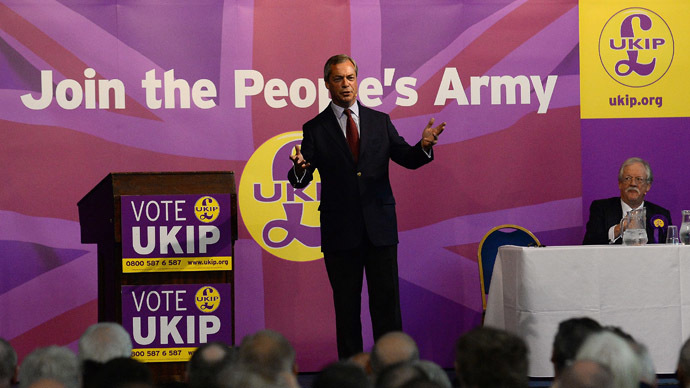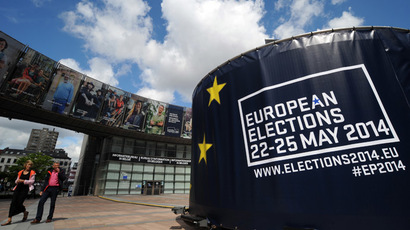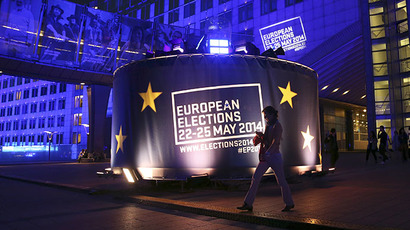Anti-EU voters to back UKIP again in Britain’s 2015 general election - poll

Most of the over four million British voters who backed UKIP in last week’s EU parliamentary elections are determined to cast their votes for the Eurosceptic party once again in the upcoming national election in 2015, a new poll shows.
The anti-EU UK Independence Party (UKIP) did surprisingly well in
the European election, gaining 27.5 percent of the vote and
outpacing the ruling Conservatives and opposition Labour party.
The survey, conducted by ComRes and published in The Telegraph on
Saturday, suggests that 86 percent of the 4.3 million people who
voted for UKIP last week will do so again in the national
parliamentary election next year. This would break the previous
trend which saw UKIP support in the EU election disappearing on
the national ballot.
Just under 40 percent said they were “certain” they
would support the party again, while 49 percent said they were
“likely” to do so. Fourteen percent said they would
probably vote differently. ComRes interviewed 4,078 adults
between May 23-26.
According to another ComRes survey conducted for ITV News and
published on May 29, nearly three quarters – 72 percent of UKIP
voters at the 2014 European Parliament election – could see
themselves voting for the party in the general election in May of
next year.
The party calls for Britain to leave the European Union. UKIP's
leader, Nigel Farage, stands for increased border controls within
the EU.
"I knew that once the British people were made aware that we
had lost control of our borders and that the majority of our laws
are now made in Brussels and not Westminster, there would be a
seismic shift in the political landscape of Britain,"
English businessman and UKIP donor Paul Sykes, who funded the
latest ComRes poll, wrote in The Telegraph.

In the 2010 UK general election, UKIP received just above three
percent of the vote, failing to win a single seat in parliament.
According to the Saturday poll, the largest share of those who
back the anti-EU party and Farage had supported the Conservatives
in the previous general election.
"A third (33 percent) of 2010 Conservative voters could see
themselves voting UKIP in a general election, compared with a
quarter (25 percent) of 2010 Lib Dem voters, and 18 percent of
2010 Labour voters," the ComRes poll states.
Paul Sykes said the ruling Conservative party should draw
conclusions. “At present Conservative MPs (with a few
honorable exceptions) appear to be in denial about the scale of
the popular uprising against our current rulers. This is despite
their party finishing third in the elections," he said.
The businessman added that Conservative Prime Minister David
Cameron's pledge "to reduce immigration to ‘tens of
thousands’ is in tatters. When it comes to the EU, Britain is
borderless, unlike the vast majority of the countries of the
world, who rightly see the power to decide who enters their
territory as an essential component of national
sovereignty."
UKIP hopes to win its first Member of Parliament (MP) at a
single-seat election in the central England constituency of
Newark next week. The position is currently held by the
Conservatives.














